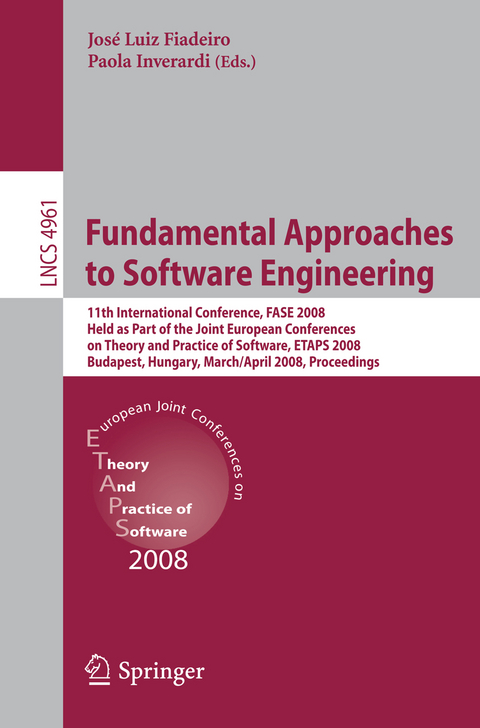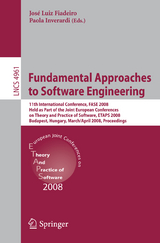Fundamental Approaches to Software Engineering
Springer Berlin (Verlag)
978-3-540-78742-6 (ISBN)
ETAPS2008wasthe11thinstanceoftheEuropeanJointConferencesonTheory and Practice of Software. ETAPS is an annual federated conference that was established in 1998 by combining a number of existing and new conferences. This yearit comprised?ve conferences (CC, ESOP,FASE, FOSSACS, TACAS), 22satelliteworkshops(ACCAT,AVIS,Bytecode,CMCS,COCV,DCC,FESCA, FIT, FORMED, GaLoP, GT-VMT, LDTA, MBT, MOMPES, PDMC, QAPL, RV,SafeCert,SC,SLA++P,WGT,andWRLA),ninetutorials,andseveninvited lectures (excluding those that were speci?c to the satellite events). The ?ve main conferences received 571 submissions, 147 of which were accepted, giving an overall acceptance rate of less than 26%, with each conference below 27%. Congratulationsthereforetoallthe authorswhomadeittothe ?nalprogramme! I hope that most of the other authors will still have found a way of participating in this exciting event, and that you will all continue submitting to ETAPS and contributing to make of it the best conference in the area. The events that comprise ETAPS address various aspects of the system - velopment process, including speci?cation, design, implementation, analysis and improvement. The languages, methodologies and tools which support these - tivities are all well within its scope. Di?erent blends of theory and practice are represented, with an inclination towards theory with a practical motivation on the one hand and soundly based practice on the other. Many of the issues involved in software design apply to systems in general, including hardware s- tems, and the emphasis on software is not intended to be exclusive.
Requirements and Architectures.- Deriving Non-zeno Behavior Models from Goal Models Using ILP.- What's in a Feature: A Requirements Engineering Perspective.- Formal Approach to Integrating Feature and Architecture Models.- Models, Model Transformations I.- Correctness-Preserving Configuration of Business Process Models.- Consistent Integration of Models Based on Views of Visual Languages.- Translating Model Simulators to Analysis Models.- Conceptual Models, UML.- Orthographic Modeling Environment.- HOL-OCL: A Formal Proof Environment for uml/ocl.- Towards Faithful Model Extraction Based on Contexts.- Leveraging Patterns on Domain Models to Improve UML Profile Definition.- Service Engineering/Adaptable Services.- When Things Go Wrong: Interrupting Conversations.- Distributed Behavioural Adaptation for the Automatic Composition of Semantic Services.- Engineering Service Oriented Applications: From StPowla Processes to SRML Models.- Verification and Testing I.- A Logic of Graph Constraints.- A Generic Complete Dynamic Logic for Reasoning About Purity and Effects.- Modelling and Verification of Timed Interaction and Migration.- A Model Checking Approach for Verifying COWS Specifications.- Verification and Testing II.- Contextual Integration Testing of Classes.- An Automatic Verifier for Java-Like Programs Based on Dynamic Frames.- A Domain Analysis to Specify Design Defects and Generate Detection Algorithms.- Automated Analysis of Permission-Based Security Using UMLsec.- Objects and Components.- Software Quality Improvement Via Pattern Matching.- Object Composition in Scenario-Based Programming.- Regular Inference for State Machines Using Domains with Equality Tests.- COMP-REF: A Technique to Guide the Delegation of Responsibilities to Components in Software Systems.-Models, Model Transformations II.- Verification of Architectural Refactorings by Rule Extraction.- Formal Model-Driven Program Refactoring.- An Algebraic Semantics for MOF.- A Formal Framework for Developing Adaptable Service-Based Applications.- Language-Based Optimisation of Sensor-Driven Distributed Computing Applications.- Clint: A Composition Language Interpreter (Tool Paper).
| Erscheint lt. Verlag | 18.3.2008 |
|---|---|
| Reihe/Serie | Lecture Notes in Computer Science | Theoretical Computer Science and General Issues |
| Zusatzinfo | XIII, 434 p. |
| Verlagsort | Berlin |
| Sprache | englisch |
| Maße | 155 x 235 mm |
| Gewicht | 682 g |
| Themenwelt | Mathematik / Informatik ► Informatik ► Software Entwicklung |
| Informatik ► Theorie / Studium ► Compilerbau | |
| Schlagworte | algorithms • Bayesian networks • classification • Clustering • Component Systems • Distributed Computing • Distributed Systems • formal methods • Hardcover, Softcover / Informatik, EDV/Informatik • HC/Informatik, EDV/Informatik • Logic • Metamodeling • Model Checking • Modeling • modeling technics • Modeling Techniques • Object-Oriented Software • problem orientation • program analysis • quality prediction • Refactoring • Requirements Engineering • Safety Analysis • Semantics • software architecture • Software Development Tools • Software Product Families • Specification • Systems Analysis • systems modeling • UML • unified modeling language (UML) • Validation • verification • Web Services |
| ISBN-10 | 3-540-78742-9 / 3540787429 |
| ISBN-13 | 978-3-540-78742-6 / 9783540787426 |
| Zustand | Neuware |
| Haben Sie eine Frage zum Produkt? |
aus dem Bereich




